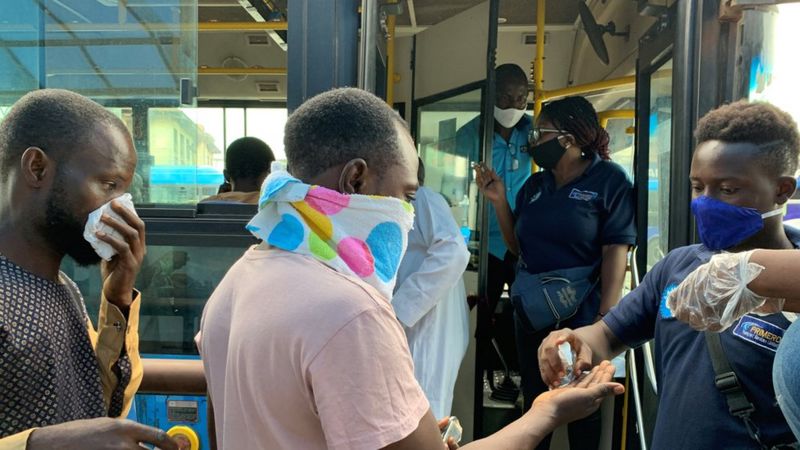The World Health Organization (WHO) has said the Covid-19 outbreak in Africa may have passed its peak but warns governments not to be complacent as countries relax their restrictions.
The number of new daily confirmed cases overall has been dropping for about two months now, although some countries are still seeing a rise in cases.
At what rate is coronavirus spreading?
Over the past four weeks, there has been an average 3% fall in the number of weekly new cases being reported, according to the Africa Centres for Disease Control (CDC).
But the CDC warns that Africa is not out of the woods yet.
"I don't think we are over the first wave yet, we have not yet hit the bottom at all," says the CDC's John Nkengasong.
And there are still some countries seeing rising case numbers.
The North Africa region recorded a 14% increase in cases over the past four weeks. Morocco has been experiencing an increase in new cases and had the highest number of new cases on the continent over the past week.
Libya and Tunisia were also among the five countries with the highest number of new cases over the week at number three and four.
The others countries reporting high number of new cases are South Africa which was second, and Ethiopia at position five.
There was a 56% increase in cases reported in Central Africa but Africa CDC's John Nkengasong says that could have been caused by batch testing, where testing results are held for some days then released at once. This contributes to spikes on days when the results are released.
All the other regions - Southern, Western and Eastern Africa - reported declines in cases on average over the past four weeks.
The global humanitarian relief body, the International Rescue Committee, says it believes the true scale of the pandemic may be hidden because of a lack of testing and issues with data.
And the WHO says changes in testing capacity and strategy can also affect numbers.
One example is Kenya where reported case numbers have been dropping for more than a month now after the country changed its testing strategy to focus on higher-risk groups only.
Others like Ethiopia have boosted testing. There was a steady increase in case of numbers since mid-June, but no new cases have been on a decline.
Ethiopia is currently the fourth on the continent in cumulative cases after South Africa, Morocco and Egypt.
Which countries have been most affected?
South Africa has the highest recorded number of total cases and reported deaths in Africa, and the eighth-highest number of cases in the world.
Daily reported numbers and hospital admissions have been falling for close on two months, but the number of deaths is not falling at the same rate.
This could be explained by the time lag between a patient being infected and then becoming ill enough to eventually die.
But a change in testing policy in South Africa could also have had an effect on the numbers of new cases.
"The country's current policy of testing only those who present with symptoms makes full interpretation of case numbers difficult," the WHO says.
South Africa's National Institute for Communicable Diseases says changes in access to testing could also have contributed to changes in the number of confirmed cases.
And research from the South African Medical Research Council (SAMRC) indicates the number of people who have died from the virus could be much higher than reported.
It says excess deaths, which is the difference between deaths over a particular period and the historical average, rose by 17,000 - that's a 59% increase compared with previous years.
Morocco has now overtaken Egypt and has the second-highest number of cases, although Egypt is still the second in terms of deaths recorded so far.
The WHO says this could be partly because of the relatively young population in Africa - more than 60% under the age of 25.
Covid-19 is known to have a higher mortality rate for older age groups, and among people health problems like obesity and type 2 diabetes which is also less common in Africa.
Experts also say expertise in epidemic control from tackling other outbreaks, cross-immunity from other coronaviruses, low travel and outdoor living could also be contributing to Africa coping better.
In terms of what proportion of people who get Covid-19 go on to die, there were 10 African countries with rates comparable with or higher than the global average rate of 3.1% on 23 September.
How much testing is done in Africa?
Ten countries account for close to 80% of the total tests conducted - South Africa, Morocco, Ethiopia, Egypt, Ghana, Kenya, Nigeria, Rwanda, Uganda and Mauritius.
There are wide variations in testing rates, with South Africa doing the most and Nigeria doing relatively few per capita, according to Our World in Data, a UK-based project which collates Covid-19 information.
Source: BBC News

